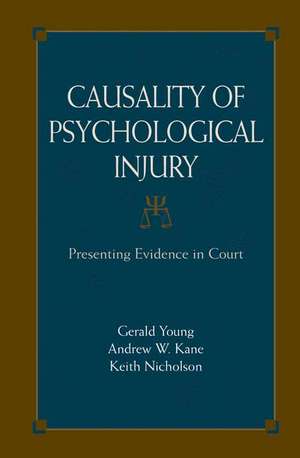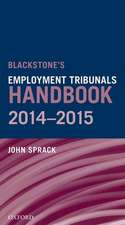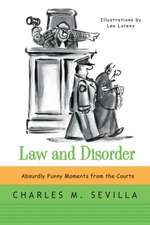Causality of Psychological Injury: Presenting Evidence in Court
Autor Gerald Young Contribuţii de Daniel Shuman Autor Andrew W. Kane, Keith Nicholsonen Limba Engleză Hardback – 9 feb 2007
Focusing on PTSD, traumatic brain injury, and chronic pain (and grounding readers in salient U.S. and Canadian case law), Causality sets out a multifactorial causality framework to facilitate admissibility of psychological evidence in court. Issues concerning malingering are examined in depth, as are clinical gray areas that can jeopardize validity. At the same time, the book clearly explains what lawyers and clinicians need to understand about each other’s work—of crucial importance since the two sides often seem to speak at cross-purposes.
The authors and six guest contributors
Illustrate the roles of preexisting vulnerabilities, traumatic events, and post-event occurrences in psychological impairment and disability
Review the literature on PTSD, TBI, and chronic pain for legal relevance
Identify current challenges and controversies in the field, as well as emerging areas for research
Recommend methods and instruments for conducting more courtworthy assessments
Provide a detailed critical review of malingering and related phenomena
Propose a more accurate, shared terminology of causality
Valid causality judgments are based on sound knowledge of research on large populations and careful testing of individuals; at the same time they must conform to stringent legal standards of relevance and reliability to be accepted for testimony. Forensic practitioners and attorneys will turn to Causality of Psychological Injury as their professional paths increasingly cross in seeking comprehensive and state of the art information.
| Toate formatele și edițiile | Preț | Express |
|---|---|---|
| Paperback (1) | 709.41 lei 6-8 săpt. | |
| Springer Us – 29 oct 2010 | 709.41 lei 6-8 săpt. | |
| Hardback (1) | 659.86 lei 6-8 săpt. | |
| Springer Us – 9 feb 2007 | 659.86 lei 6-8 săpt. |
Preț: 659.86 lei
Preț vechi: 776.31 lei
-15% Nou
Puncte Express: 990
Preț estimativ în valută:
126.38€ • 130.20$ • 105.86£
126.38€ • 130.20$ • 105.86£
Carte tipărită la comandă
Livrare economică 24 februarie-10 martie
Preluare comenzi: 021 569.72.76
Specificații
ISBN-13: 9780387364353
ISBN-10: 0387364358
Pagini: 660
Ilustrații: XII, 648 p.
Dimensiuni: 156 x 235 x 41 mm
Greutate: 1.09 kg
Ediția:2007
Editura: Springer Us
Colecția Springer
Locul publicării:New York, NY, United States
ISBN-10: 0387364358
Pagini: 660
Ilustrații: XII, 648 p.
Dimensiuni: 156 x 235 x 41 mm
Greutate: 1.09 kg
Ediția:2007
Editura: Springer Us
Colecția Springer
Locul publicării:New York, NY, United States
Public țintă
Professional/practitionerCuprins
Causality, Psychological Injuries, and Court: Introduction.- Causality, Psychological Injuries, and Court: Introduction.- Causality and Psychological Evidence: Concepts, Terms, Issues.- Causality in Psychology and Law.- Causality: Concepts, Issues, and Recommendations.- Dictionary of Terms Related to Causality, Causation, Law, and Psychology.- Multicausal Perspectives on Psychological Injury I: PTSD and MTBI.- Multicausal Perspectives on Psychological Injury II: Chronic Pain.- Multicausal Perspectives on Psychological Injury III: Conclusions.- Pain, Affect, Nonlinear Dynamical Systems, and Chronic Pain: Bringing Order to Disorder.- Considering Course and Treatment in Rehabilitation: Sequential and Dynamic Causality.- Causality in Court: Psychological Considerations.- Basic Concepts in Psychology and Law.- Conducting a Psychological Assessment.- Other Psycho-Legal Issues.- Summary and Conclusions.- Malingering in Psychological Injury: TBI, Chronic Pain, and PTSD.- Malingering: Overview and Basic Concepts.- The Effect of Compensation Status.- Malingering: Traumatic Brain Injury.- Malingering: Chronic Pain.- Malingering: Posttraumatic Stress Disorder and Depression.- Malingering: Summary and Conclusions.- Causality, Psychology, and Law.- Causation, Psychology, and Law.- Causality, Psychological Injuries, and Court: Conclusions.
Recenzii
From the reviews:
"Causality of Psychological Injury: Presenting Evidence in Court is an edited volume with chapters that are not only informative but also well written. The references that I sampled are relevant, useful, and probably as current as any could be in a nonelectronic book … . surely heightens its educational value to clinical and forensic practitioners and should shape corresponding professional thinking and praxis." (Richard W. Bloom, PsycCritiques, Vol. 52 (37), 2007)
"I was delighted to find a concise summary of why third party observers should not be allowed during the course of a forensic neuropsychological examination, touching on such seminal issues as proper test administration, norms, ethical issues as well as legal precedents prohibiting this practice. The summary was so well done. … This information was also quite helpful in formulating the expert affidavit … . I found this volume to be responsive to some very different dilemmas I encountered in my civil practice." (Jerid M. Fisher, Archives of Clinical Neuropsychology, December, 2007)
"Causality of Psychological Injury … addresses issues pertinent to psychological assessment in personal injury cases in a well-organized, comprehensive, and authoritative manner. … The writing is clear and concise, and is useful for both those who wish to expand their practice into this area of forensic psychology, as well as the more experienced forensic psychologist or psychiatrist … . Causality of Psychological Injury fills a serious gap in the forensic psychological literature … . I recommend it without reservation." (Eric G. Mart, Psychological Injury and Law, Vol. 1, 2008)
"Causality of Psychological Injury: Presenting Evidence in Court is an edited volume with chapters that are not only informative but also well written. The references that I sampled are relevant, useful, and probably as current as any could be in a nonelectronic book … . surely heightens its educational value to clinical and forensic practitioners and should shape corresponding professional thinking and praxis." (Richard W. Bloom, PsycCritiques, Vol. 52 (37), 2007)
"I was delighted to find a concise summary of why third party observers should not be allowed during the course of a forensic neuropsychological examination, touching on such seminal issues as proper test administration, norms, ethical issues as well as legal precedents prohibiting this practice. The summary was so well done. … This information was also quite helpful in formulating the expert affidavit … . I found this volume to be responsive to some very different dilemmas I encountered in my civil practice." (Jerid M. Fisher, Archives of Clinical Neuropsychology, December, 2007)
"Causality of Psychological Injury … addresses issues pertinent to psychological assessment in personal injury cases in a well-organized, comprehensive, and authoritative manner. … The writing is clear and concise, and is useful for both those who wish to expand their practice into this area of forensic psychology, as well as the more experienced forensic psychologist or psychiatrist … . Causality of Psychological Injury fills a serious gap in the forensic psychological literature … . I recommend it without reservation." (Eric G. Mart, Psychological Injury and Law, Vol. 1, 2008)
Notă biografică
Gerald Young, Ph.D., C. Psych., is an Associate Professor in the Department of Psychology at Glendon College, York University, Toronto, Canada. He teaches Rehabilitation Psychology to senior undergraduates. In addition, he is a licensed psychologist in Ontario and Quebec, practicing in rehabilitation, in particular. He is the author or co-author of four books, and multiple chapters and articles. He is a member of Canadian registers in clinical practice and disability assessment. He has undertaken over 1,000 assessments related to rehabilitation and disability claims for psychological injury, including after referral for medicolegal purposes from attorneys, insurance companies, and assessment companies. He is a member of the college policy and planning committee, having served in this function at the university level, as well. For the field of psychological injury and law, he is organizing the first (a) professional association, (b) the first academic journal, (c) the first graduate-level textbook related to the field, and (d) the first book series. Springer is considering supporting these publishing initiatives.
Andrew Kane, Ph.D., ABAP, is a licensed psychologist in private practice in Milwaukee. He is a diplomat of the American Board of Assessment Psychologists, is listed in the National Register of Health Service Providers in Psychology, and is a recipient of the Certificate of Professional Qualification in Psychology of the Association of State and Provincial Psychology Boards. He is a Professor at Wisconsin School of Professional Psychology, an Adjunct Clinical Professor in the department of Psychology at University of Wisconsin-Milwaukee, and an Associate Clinical Professor, Department of Psychiatry and Behavioral Medicine, Medical College of Wisconsin. He is the author or co-author of eight books and some five dozen professional papers and chapters. He served as a member of the Expert Panel on Psychiatric and Psychological Evidence of the Commission on Mental and Physical Disability Law of the American Bar Association, which helped produce the National Benchbook on Psychiatric and Psychological Evidence and Testimony, published by the ABA. He is a former president of the Wisconsin Psychological Association and of its Division of Forensic and Correctional Psychologists. Dr. Kane also served as a member of the board of the Wisconsin Psychological Association's forensic division. He served for ten years as a member of the Ethics Committee of the Wisconsin Psychological Association. Dr. Kane founded the Wisconsin Coalition on Sexual Misconduct by Psychotherapists and Counselors, a national model program. Dr. Kane has served as an expert in more than 3,000 civil cases involving a variety of issues.
Keith Nicholson, Ph.D., C. Psych, has had extensive clinical experience working with many different patient populations. He obtained his Ph.D. in Clinical Neuropsychology from the University of Victoria and, since then, has worked at the Toronto Western Hospital, now part of the University Health Network in Toronto, in addition to working at several community clinics and maintaining a private practice. Dr. Nicholson is now affiliated with the Comprehensive Pain Program at the Toronto Western Hospital. He has a particular interest in the psychology of chronic pain and clinical neuropsychology and has many publications in these and other areas of interest.
Andrew Kane, Ph.D., ABAP, is a licensed psychologist in private practice in Milwaukee. He is a diplomat of the American Board of Assessment Psychologists, is listed in the National Register of Health Service Providers in Psychology, and is a recipient of the Certificate of Professional Qualification in Psychology of the Association of State and Provincial Psychology Boards. He is a Professor at Wisconsin School of Professional Psychology, an Adjunct Clinical Professor in the department of Psychology at University of Wisconsin-Milwaukee, and an Associate Clinical Professor, Department of Psychiatry and Behavioral Medicine, Medical College of Wisconsin. He is the author or co-author of eight books and some five dozen professional papers and chapters. He served as a member of the Expert Panel on Psychiatric and Psychological Evidence of the Commission on Mental and Physical Disability Law of the American Bar Association, which helped produce the National Benchbook on Psychiatric and Psychological Evidence and Testimony, published by the ABA. He is a former president of the Wisconsin Psychological Association and of its Division of Forensic and Correctional Psychologists. Dr. Kane also served as a member of the board of the Wisconsin Psychological Association's forensic division. He served for ten years as a member of the Ethics Committee of the Wisconsin Psychological Association. Dr. Kane founded the Wisconsin Coalition on Sexual Misconduct by Psychotherapists and Counselors, a national model program. Dr. Kane has served as an expert in more than 3,000 civil cases involving a variety of issues.
Keith Nicholson, Ph.D., C. Psych, has had extensive clinical experience working with many different patient populations. He obtained his Ph.D. in Clinical Neuropsychology from the University of Victoria and, since then, has worked at the Toronto Western Hospital, now part of the University Health Network in Toronto, in addition to working at several community clinics and maintaining a private practice. Dr. Nicholson is now affiliated with the Comprehensive Pain Program at the Toronto Western Hospital. He has a particular interest in the psychology of chronic pain and clinical neuropsychology and has many publications in these and other areas of interest.
Textul de pe ultima copertă
This sequel to the authors’ Psychological Knowledge in Court offers a welcome expansion on key concepts, terms, and issues in causality, bringing much needed clarity to psychological injury assessments and the legal contexts that employ them.
Focusing on PTSD, traumatic brain injury, and chronic pain (and grounding readers in salient U.S. and Canadian case law), Causality sets out a multifactorial causality framework to facilitate admissibility of psychological evidence in court. Issues concerning malingering are examined in depth, as are clinical gray areas that can jeopardize validity. At the same time, the book clearly explains what lawyers and clinicians need to understand about each other’s work—of crucial importance since the two sides often seem to speak at cross-purposes.
The authors and six guest contributors
Focusing on PTSD, traumatic brain injury, and chronic pain (and grounding readers in salient U.S. and Canadian case law), Causality sets out a multifactorial causality framework to facilitate admissibility of psychological evidence in court. Issues concerning malingering are examined in depth, as are clinical gray areas that can jeopardize validity. At the same time, the book clearly explains what lawyers and clinicians need to understand about each other’s work—of crucial importance since the two sides often seem to speak at cross-purposes.
The authors and six guest contributors
- Illustrate the roles of preexisting vulnerabilities, traumatic events, and post-event occurrences in psychological impairment and disability
- Review the literature on PTSD, TBI, and chronic pain for legal relevance
- Identify current challenges and controversies in the field, as well as emerging areas for research
- Recommend methods and instruments for conducting more courtworthy assessments
- Provide a detailed critical review of malingering and related phenomena
- Propose a more accurate, shared terminology of causality
Caracteristici
Focuses on the complicated legal issues of causality Translates research for use by the practicing clinicians In depth explorations of high profile conditions -- PTSD, TBI and Chronic Pain Explains what lawyers and clinicians need to understand about each other's work Includes supplementary material: sn.pub/extras












